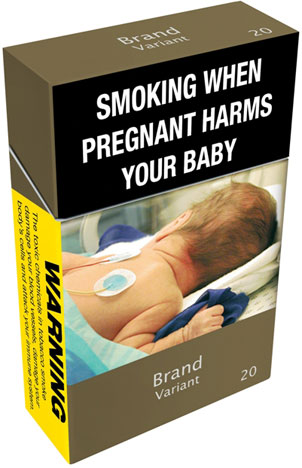|
World No Tobacco Day:
Get ready for plain packaging
World No Tobacco Day (WNTD) is observed around the world every year
on May 31. It is intended to encourage at least a 24-hour period of
abstinence from all forms of tobacco consumption around the globe. Every
year, on 31 May, the World Health Organisation (WHO) and partners mark
World No Tobacco Day, highlighting the health risks associated with
tobacco use and advocating for effective policies to reduce tobacco
consumption.
According to the WHO, tobacco kills around six million people each
year. More than five million of those deaths are the result of direct
tobacco use; and around 600,000 are due to non-smokers being exposed to
second-hand smoke.
 According
to the U.S. Centers for Disease Control and Prevention (CDC), tobacco
smoking is the top risk factor for lung cancer, with 90 percent of cases
attributed to tobacco use. More than 70% of all lung cancer patients
throughout the world are smokers or ex-smokers and, in Central Europe,
this figure is higher than 80%. According
to the U.S. Centers for Disease Control and Prevention (CDC), tobacco
smoking is the top risk factor for lung cancer, with 90 percent of cases
attributed to tobacco use. More than 70% of all lung cancer patients
throughout the world are smokers or ex-smokers and, in Central Europe,
this figure is higher than 80%.
Smoking is therefore regarded as the central risk factor for this
disease.
This year, the theme of the World No Tobacco Day is "Get ready for
plain packaging ". Plain packaging is a measure that restricts or
prohibits the use of logos, colors, brand images or promotional
information on tobacco packaging other than brand names and product
names displayed in a standard color and font style.
According to WHO, it is an important demand reduction measure that
reduces the attractiveness of tobacco products, restricts use of tobacco
packaging as a form of tobacco advertising and promotion, limits
misleading packaging and labelling, and increases the effectiveness of
health warnings.
Australia was the first country to introduce plain packaging back in
2012, which bans the use of all trademarks on tobacco packaging and
requires that all tobacco products be sold in virtually identical,
government-designed packaging. A number of countries, including Ireland,
United Kingdom and France, have passed the laws to implement plain
packaging or in advanced stages of considering adoption. Sri Lanka has
also adopted the use of plain packaging with graphical pictorial
warnings.
The WHO Global Tobacco Treaty recommends that Parties consider
adoption of plain packaging. Through the World No Tobacco Day 2016, WHO
aims to highlight the role of plain packaging as part of a
comprehensive, multispectral approach to tobacco control and facilitate
policy development by Member States.
Moreover, WHO encourages Member States to work towards plain
packaging in a step-wise approach by strengthening packaging and
labelling measures and restrictions on advertising, promotion and
sponsorship.
Almost all countries in the Asian-Pacific region (barring Indonesia)
have ratified the Global Tobacco Treaty (formally called the WHO
Framework Convention on Tobacco Control). Countries in the region have
vowed to enforce the treaty and domestic tobacco control and health laws
effectively, and not just for saving lives from lung cancer but also
from a range of life-threatening diseases attributed to tobacco use.
Tobacco use is addictive, alters the neurochemistry of the brain,
causes long-term adverse health consequences and leads to illness and
death. Although cigarette advertisements are banned in India, youth are
lured by the 'macho' characters in the movies. As tobacco products are
very ubiquitous, many youngsters want to try it over and over, and it
eventually becomes a habit.
The WHO is also fighting against another menace: illicit tobacco. The
US State Department, Interpol, the United Nations and others view
illegal tobacco as a worldwide epidemic that funds criminal and
terrorist organisations. In March, 700 Canadian police officers
conducted the largest tobacco smuggling bust in North American history.
Their targets were funnelling profits to purchase cocaine and
laundering money as far away as Europe. Recently authorities seized
tobacco and guns destined for terrorist groups in Libya. Each year, more
than 400 billion cigarettes are illegally sold globally, making it the
most widely smuggled legal product in the world.
- WHO
|

